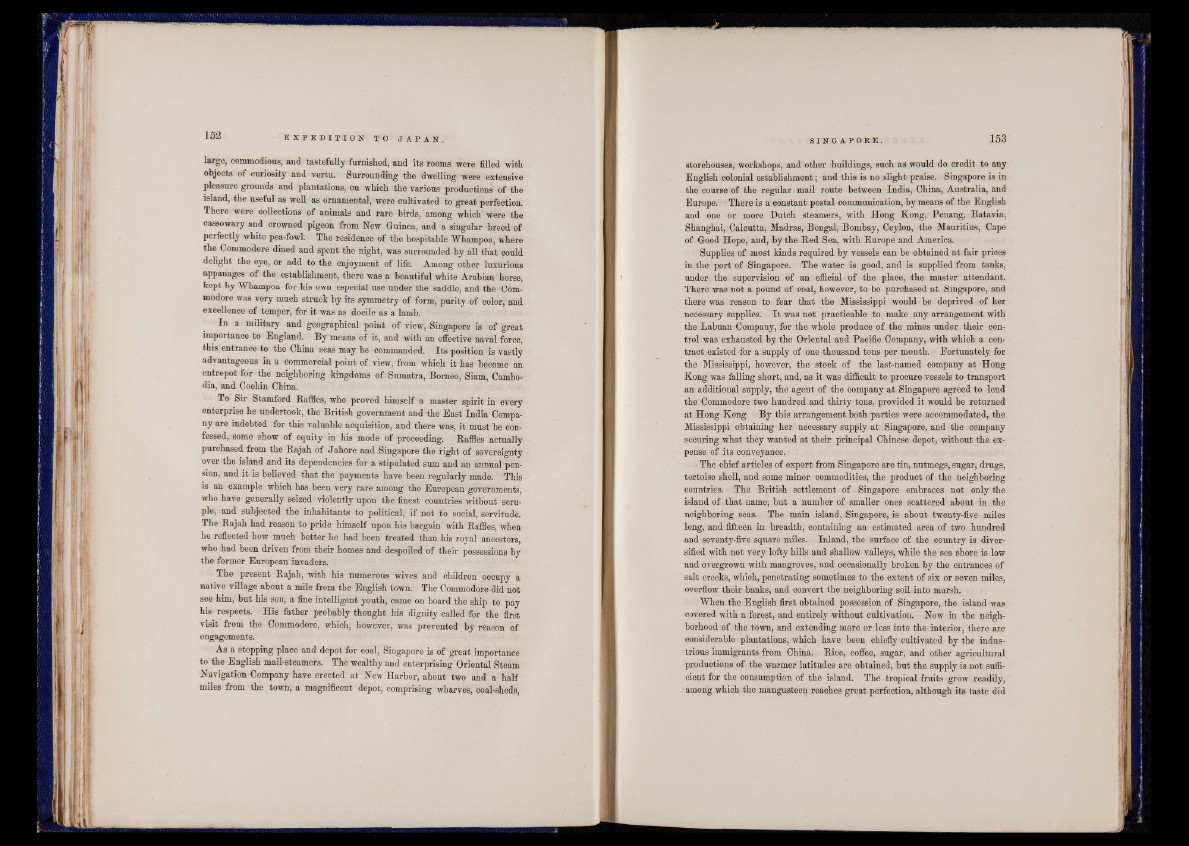
large, commodious, and tastefully furnished, and its rooms were filled with
objects of curiosity and yertu. Surrounding the dwelling were extensive
pleasure grounds and plantations, on which the various productions of the
island, the useful as well as ornamental, were cultivated to great perfection.
There were collections of animals and rare hirds, among which were the
cassowary and crowned pigeon from New Guinea, and a singular breed of
perfectly white pearfowl. The residence of the hospitable Whampoa, where
the Commodore dined and spent the night, was surrounded by all that oould
delight the eye, or add to the enjoyment of life. Among other luxurious
appanages of the establishment, there was a beautiful white Arabian horse,
kept by Whampoa for his own especial use under the saddle, and the Commodore
was very much struck by its symmetry of form, purity of color, and
excellence of temper, for it was as docile as a lamb.
In a military and geographical point of view, Singapore is of great
importance to England. By means of it, and with an effective naval foree,
this entrance to the China seas may be commanded. Its position is vastly
advantageous in a commercial point of view, from which it has become an
entrepot for the neighboring kingdoms of Sumatra, Borneo, Siam, Cambodia,
and Cochin China.
To Sir Stamford Baffles, who proved himself a master spirit in every
enterprise he undertook, the British government and the East India Company
are indebted for this valuable acquisition, and there was, it must be confessed,
some show of equity in his mode of proceeding. Baffles actually
purchased from the Bajah of Jahore and Singapore the fight of sovereignty
over the island and its dependencies for a stipulated sum and an annual pension,
and it is believed that the payments have been regularly made. This
is an example which has been very rare among the European governments,
who have generally seized violently upon the finest countries without scruple,
and subjected the inhabitants to political, if not to social, servitude.
The Bajah had reason to pride himself upon his bargain with Baffles, when
he reflected how much better he had been treated than his royal ancestors,
who had been driven from their homes and despoiled of their possessions by
the former European invaders.
The present Bajah, with his numerous wives and children occupy a
native village about a mile from the English town. The Commodore did not
see him, but his son, a fine intelligent youth, came on board the ship to pay
his respects. His father probably thought his dignity called for the first
visit from the Commodore, which, however, was prevented by reason of
engagements.
As a stopping place and depot for coal, Singapore is of great importance
to the English mail-steamers. The wealthy and enterprising Oriental Steam
Navigation Company have erected at New Harbor, about two and a half
miles from the town, a magnificent depot, comprising wharves, coal-sheds,
storehouses, workshops, and other buildings, such as would do credit to any
English colonial establishment; and this is no slight praise. Singapore is in
the course of the regular mail route between India, China, Australia, and
Europe. There is a constant postal communication, by means of the English
and one or more Dutch steamers, with Hong Kong, Penang, Batavia,
Shanghai, Calcutta, Madras, Bengal, Bombay, Ceylon, the Mauritius, Cape
of Good Hope, and, by the Bed Sea, with Europe and America.
Supplies of most kinds required by vessels can be obtained at fair prices
in the port of Singapore. The water is good, and is supplied from tanks,
under the supervision of an official of the place, the master attendant.
There was not a pound of coal, however, to be purchased at Singapore, and
there was reason to fear that the Mississippi would be deprived of her
necessary supplies. I t was not practicable to make any arrangement with
the Labuan Company, for the whole produce of the mines under their control
was exhausted by the Oriental and Pacific Company, with which a contract
existed for a supply of one thousand tons per month. Fortunately for
the Mississippi, however, the stock of the last-named company at Hong
Kong was falling short, and, as it was difficult to procure vessels to transport
an additional supply, the agent of the company at Singapore agreed to lend
the Commodore two hundred and thirty tons, provided it would be returned
at Hong Kong By this arrangement both parties were accommodated, the
Mississippi obtaining her necessary supply at Singapore, and the company
securing what they wanted at their principal Chinese depot, without the expense
of its conveyance.
The chief articles of export from Singapore are tin, nutmegs, sugar, drugs,
tortoise shell, and some minor commodities, the product of the neighboring
countries. The British settlement of Singapore embraces not only the
island of that name, but a number of smaller ones scattered about in the
neighboring seas. The main island, Singapore, is about twenty-five miles
long, and fifteen in breadth, containing an estimated area of two hundred
and seventy-five square miles. Inland, the surface of the country is diversified
with not very lofty hills and shallow valleys, while the sea shore is low
and overgrown with mangroves, and occasionally broken by the entrances of
salt creeks, which, penetrating sometimes to the extent of six or seven miles,
overflow their banks, and convert the neighboring soil into marsh.
When the English first obtained possession of Singapore, the island was
covered with a forest, and entirely without cultivation. Now in the neighborhood
of the town, and extending more or less into the interior, there are
considerable plantations, which have been chiefly cultivated by the industrious
immigrants from China. Bice, coffee, sugar, and other agricultural
productions of the warmer latitudes are obtained, but the supply is not sufficient
for the consumption of the island. The tropical fruits grow readily,
among which the mangusteen reaches great perfection, although its taste did